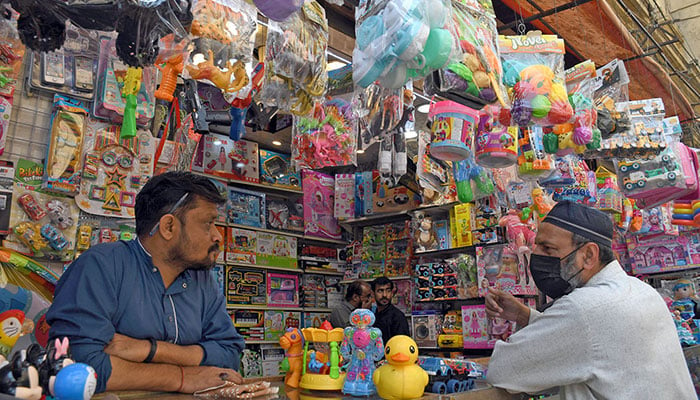Old habits die hard and this is true for this PML-N budget as well  A vendor stands at a kid's toys shop in a market in Karachi on February 15, 2023. — APP
A vendor stands at a kid's toys shop in a market in Karachi on February 15, 2023. — APP
A NEW budget is upon us and it does not herald the reforms and economic revival we need. It is, as most of our budgets are, a set of measures to tax the already taxed (without touching property, agriculture and the NFC) and meeting the IMF conditions.
Old habits die hard and this is true for this PML-N budget as well. Total federal development spending has been kept at Rs1700 billion, including Rs1400 billion for PSDP, Rs100 billion through public-private partnership and Rs200 billion to be spent through government-owned companies. Most egregiously, Rs75 billion have also been allocated for MNA projects in the PSDP.
This increase in development spending is completely unaffordable at a time when the federal government’s budget deficit is projected to be Rs8500 billion. Similarly, the NEC also approved provincial development schemes of over Rs2 trillion, bringing the corruption-and-inefficiency riddled ‘development’ spending in the country to Rs3800 billion, and requiring over $3 billion of new dollar loans. It seems this budget is made for the benefit of governments in federal and provincial capitals and our leaders have no idea how tough life for the middle class has become.
The projected federal deficit of Rs8500 billion will be financed by a combination of borrowing from banks (crowding out private investment), new foreign loans, provincial surpluses, and the SBP printing more money, causing inflation. So the hope of lower inflation now rests squarely on the shoulders of the current low international oil and commodity prices. Any increases there will translate into higher inflation here.
Tax revenues are projected to be Rs12,970 billion against this year’s revised target of Rs9250 billion. This is an increase of 40 per cent. Of this, 17 per cent (or Rs1572 billion) is what the FBR calls autonomous growth: inflation rate plus GDP growth rate. The remaining Rs2148 billion is from new taxes or measures. This is 2.0 per cent of GDP and in this low-growth environment, either we will not meet the tax target or not achieve even the anaemic economic growth target of 3.5 per cent. Of course in either case, we will further decrease the disposable income of Pakistanis.
New taxes include increased tax rates on stores registered with the FBR, withdrawal of exemptions that will increase the price of many everyday items, increase in petroleum levy of up to Rs20 per litre, and increase on taxes for salaried employees by moving down tax slabs but without increasing the highest slab from 35 per cent (so all employees will end up paying more taxes).
There isn’t a new tax on retailers but withholding tax on manufacturers has been increased to sell to non-registered retailers. This is similar to an increase in sales tax by 2.25 per cent and consumers will see this reflected in higher prices. It’s a good thing pensioners and salaried people don’t need food or medicine -- or else they will find it more difficult to make ends meet!
The burden of most of the new taxes will fall on the middle classes. We have again ignored horizontal equity in taxation -- people with similar incomes, whatever the source, pay similar taxes. We have also disregarded the principle of vertical equity -- richer people pay a higher proportion of their income in taxes. We continue to coddle the powerful and tax the middle class.
Taxpayers will again subsidise the energy sector by over Rs1300 billion. Despite this, we will continue to have the back breaking power tariffs that we do. This should be a clear call to privatise the entire power industry -- from transmission to distribution to generation. And it should also be a lesson learned from the past policy mistakes of relying too much on imported fuel and borrowing and investing huge amounts of money without thinking through how we will pay it back. But are we ready to learn?
The allocation for BISP has increased from Rs425 billion to Rs530 billion. I am encouraged by the newly announced government programme where children of BISP recipients will be trained in some trade. I am also happy to see a school meal programme in Islamabad and hope provinces will also adopt this.
According to the World Bank, we have 90 million Pakistanis living in poverty and another 10 million being added this year. I didn’t see any programme in the budget that would increase industrialisation or enhance farm output or otherwise spur economic growth so that these people can get jobs and stand on their feet again. I also didn’t see any measures to encourage exports -- instead tax on exporters was actually increased.
I have been where today two good men, Mohammad Aurangzeb and Secretary Finance Imdad Bosal, are serving. I know the stress of IMF negotiations, the political compulsions of their bosses and the constraints of our economy. Had these two men been given greater room, they could have given us a better budget and not missed this opportunity to reform.
The writer is a former finance minister of Pakistan.









